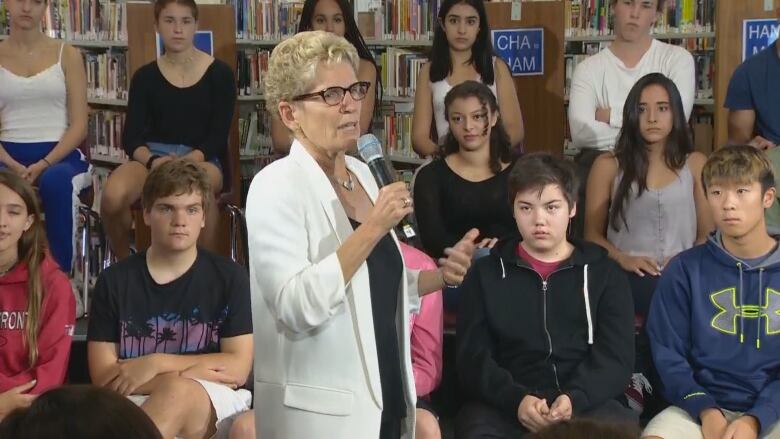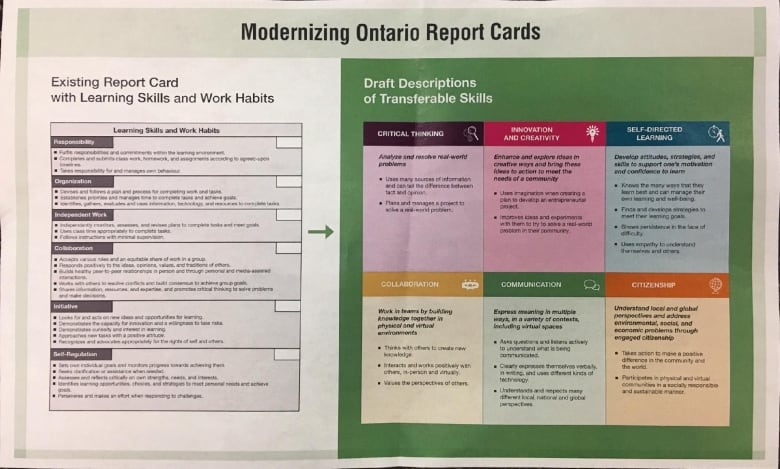Ontario to introduce new report cards and re-examine EQAO in 'curriculum refresh'
Ontario Premier Kathleen Wynne and Education Minister Mitzie Hunter made the announcement Wednesday

Ontario Premier Kathleen Wynne and Education Minister Mitzie Hunter announced a plan to modernize school curriculum on Wednesday that includes the introduction of new report cards and a focus on "transferable life skills" that will help students succeed in a 21st century economy.
"We're going to do a curriculum refresh," said Wynne, who said that the changes will come throughwide-rangingpublic consultations.
The goal, she said,is to better equip students withskills like problem-solving, communication and critical thinking, with new report cards to be introduced in the 2018-2019 academic year to better track those skills.
In a draft provided to shownew evaluation criteria, "learning skills and work habits" like organizationare replaced with six new "transferable skills."

Ontario not 'switching gears' on math
As part of the modernization plan, Hunter and Wynnealso pledged to update provincial assessment tools, including EQAOtesting.
This past year, only half of Grade 6 students who took the EQAOtestmet provincial standards in math.
"There are a couple of areas that need to be tackled," saidWynneon CBC Radio's Metro Morning on Wednesday. "One of them are math scores what is going on? That we're doing a lot of teacher training, there's a lotof support, but still, we're not seeing the improvement in achievement in math that we'd like to see."
During the news conference, Wynne was asked if looking at the math program meant the province was "switching gears" on a $60 million strategyput in place last year to improve mathematics,Wynne said it didn't.
"We made changes just last year, they haven't had a long time to set. But we do need to look at whether we're doing everything that we can to make sure kids are getting those math skills," she said.
Focus on well-being
Another aspect of the refresh is a $49-millioninvestment over three years into astudent well-being program.
Hunter said that the funding will go towards focusing on the "whole student," including cognitive, social, emotional, and physical well-being.
"We're going to be focusing on things like active transportation... mental health... and looking at flexible funding for localschool boards so that they can look at local priorities," said Hunter.
That way, she said, schools can decide whatwould boost their students' well-being the most, be it a mindfulness program or a nutrition program.
Wynne defends spending
The FraserInstitute, a conservative Vancouver-based think-tank, released a report on public school funding simultaneously with Wynne's announcement.
They say that in Ontario, public school spending has increased by $7 billion in a decade, with eight out of 10 of those dollars spent on teacher and staff salaries and pensions, while enrolment has decreased by 5.4 per cent in that same period.
Wynne defended Liberal spending on education on Wednesday, arguing that the school system was "decimated" when Liberals came into power in 2003, requiring a re-building of the "toxic" relationship between teachers and the government.
"The money that we spend on staff, to hire more staff, is all about them, its all about the students," she said, pointing tofull-day kindergarten as an example of necessary spending on staff salaries.












_(720p).jpg)


 OFFICIAL HD MUSIC VIDEO.jpg)
.jpg)



























































































